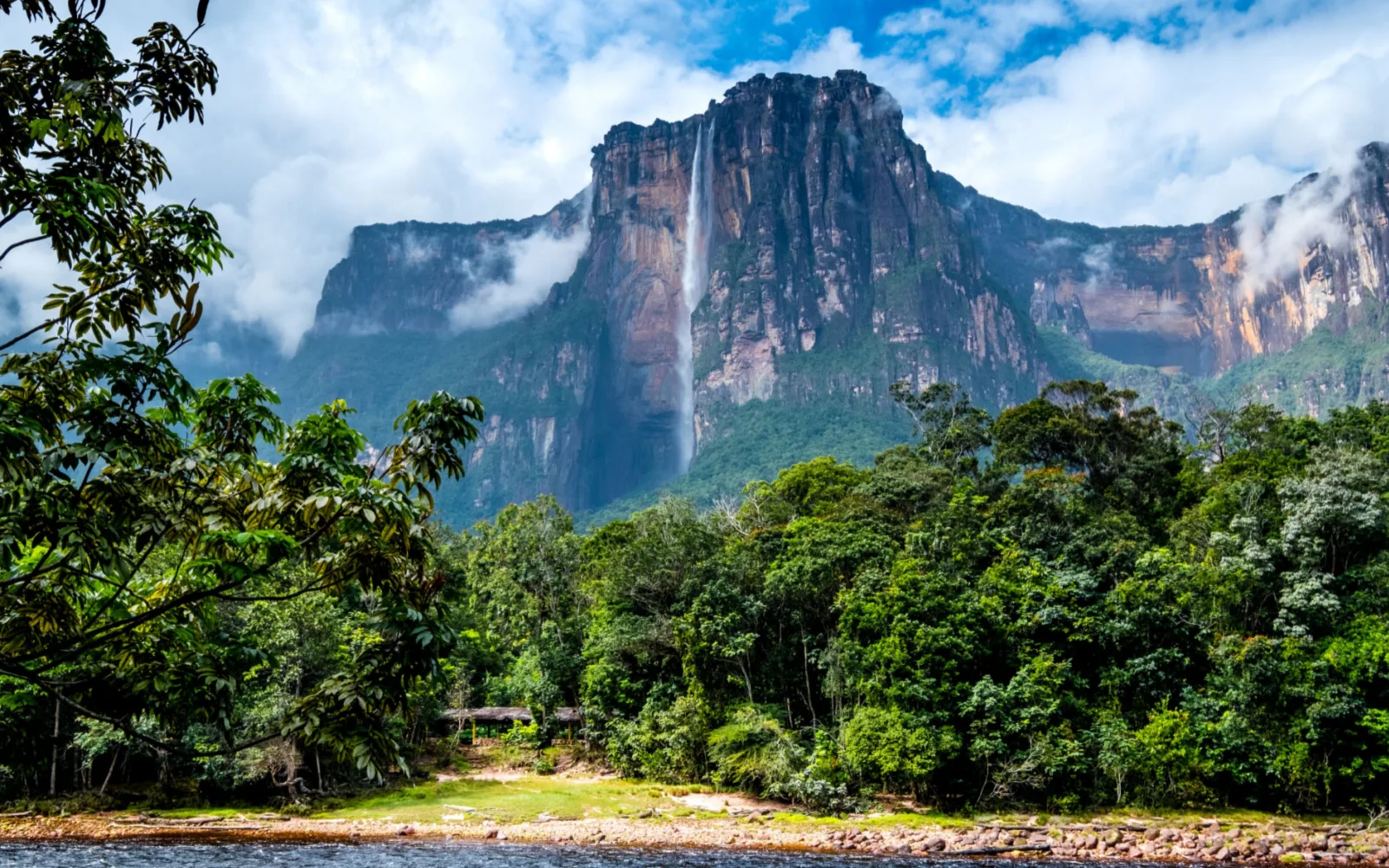Gorgeous Venezuela on the Caribbean coast of South America seems like the perfect destination for nature lovers. It has a beautiful coastline with sights such as the Los Roques Archipelago.
There’s also plenty to see inland, with Angel Falls, one of the highest waterfalls in the world, the Andes Mountains, and the Amazon rainforest. That’s three beautiful landscapes in just one country, and we didn’t even mention the colorful cities, lively culture, and amazing food!
But while this culture-rich country has plenty to see and do, is Venezuela safe to visit? Here’s our take.
Is Venezuela Safe to Visit in 2025?
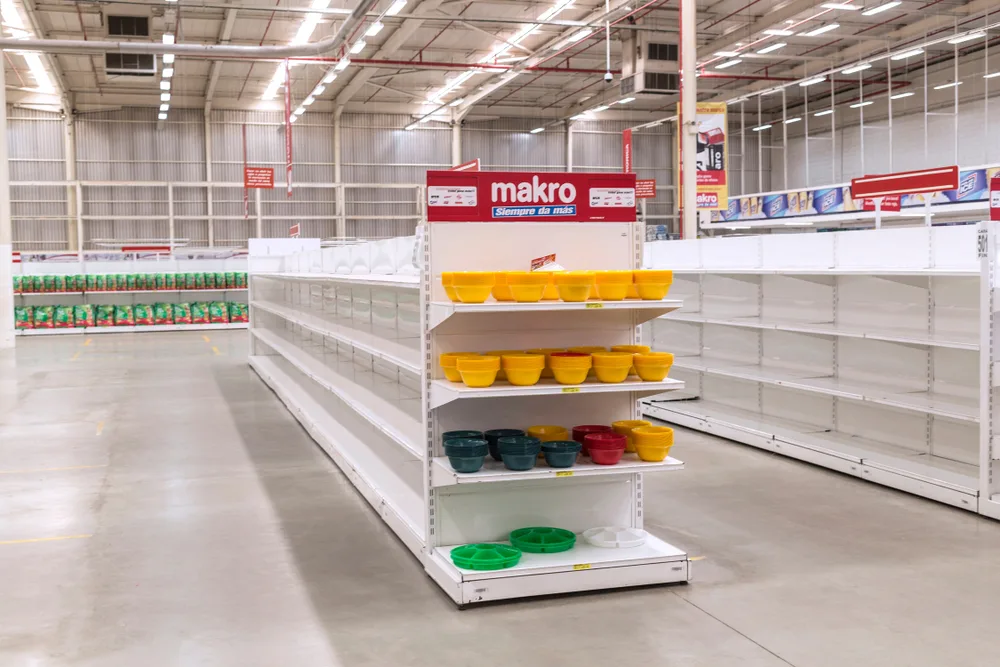
CARACAS, VENEZUELA – JANUARY 14, 2018: Empty supermarket shelves in Venezuela. Due to the economic crisis and hyperinflation in Venezuela there is a large shortage of food and medicine/Sunsinger/Shutterstock
Right now, Venezuela is not safe to visit, and foreigners should stay away. The reason is the deep economic crisis and political instability, which has led to widespread shortages and civil unrest.
The instability has created the perfect environment for crime, especially violent crime, to flourish. Many foreign governments, such as New Zealand, have “Level 4: Do Not Travel” advice in place for Venezuela.
They cite many reasons why their citizens shouldn’t go there, including political instability, ongoing shortages, and extremely high levels of crime. The roots of the crisis in Venezuela go back several years.
The country heavily relies on oil for its economy, and when oil prices went down, the Venezuelan economy went into a recession around 2015 that was compounded by sanctions in 2019.
The severe recession is ongoing and means that shortages of common goods, from medicine and gas to food and water, are very common. Millions of Venezuelans have left the country due to economic hardship over the past few years.
Don’t think that you will be able to get around shortages because you have more money than locals — the shelves in Venezuela are often bare, and there simply aren’t any goods to purchase.
There’s a reason why foreign governments advise their citizens in Venezuela to keep a stockpile of essential goods such as bottled water, basic medicine, and food at all times in case supplies run out.
The political situation compounds the economic instability. Venezuela has been ruled by one party for the past several decades, and the government is often repressive against dissent.
People are growing discontented with the government’s inability to provide their basic needs, but there is no clear opposition leader, making the situation more unstable.
Several years of desperate poverty and instability created the perfect environment for crime to flourish. Not only are petty crimes such as pickpocketing and hotel room break-ins common, but so are violent crimes.
Common violent crimes include:
- Armed robbery
- Sexual assault
- Kidnapping
- Homicide
The high rate of violent crime and instability means that Venezuela is one of the least safe places in the world to visit right now. In this situation, it’s best to follow your government’s travel advice and avoid Venezuela until the situation stabilizes.
If you decide to risk it all and travel to Venezuela, keep in mind that many governments withdrew their embassies and consulates due to political tensions and because the situation in the country became too unstable for embassy staff to live there safely.
If you get in trouble, you may not be able to rely on your government’s assistance to get you out of a scrape.
Crime in Venezuela
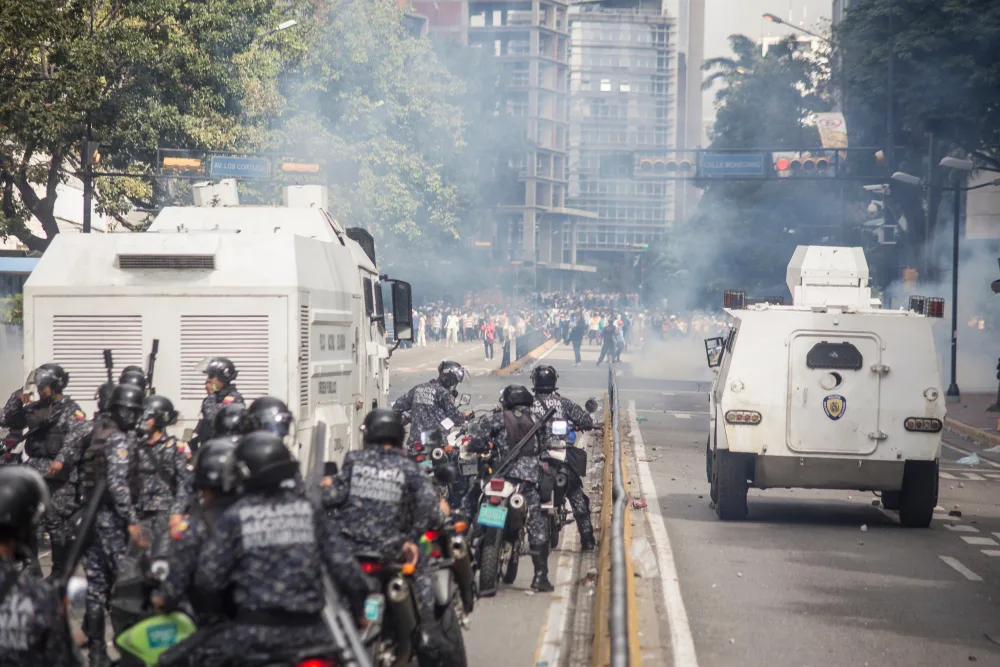
Caracas, Miranda/Venezuela – January 23rd 2019: Demonstrators clash with the police after attending rally in support of Venezuela’s National Assembly President Juan Guaido/Ruben Alfonzo/Shutterstock
One of the primary concerns for potential visitors to Venezuela is the very high level of crime. All types of crime, from property crime to violent crime, are prevalent.
The biggest concern is the high level of violent crime due to the risk it poses, mostly for locals who make up the majority of the victims, but also for foreign visitors. To get an idea of the situation in Venezuela, let’s look at some numbers.
Venezuela has one of the highest homicide rates in the world. In 2021, there were homicides at a rate of 40.9 incidents per 100,000 people.
Although homicides have been decreasing slightly each year since their peak in 2017, they haven’t decreased nearly enough to make Venezuela a safe destination. Homicide is not the only violent crime that is prevalent in Venezuela.
Other common crimes include banditry, armed robbery, and kidnapping. Sexual assault and domestic violence are common, in part fueled by the desperate situation for much of the Venezuelan population.
The unstable situation in Venezuela, combined with the instability in neighboring states, creates an ideal situation for organized crime to flourish. Organized crime syndicates are behind a lot of the violence that plagues Venezuela.
According to investigators, Venezuela is a regional hub for organized crime, with groups such as FARC from neighboring Colombia operating in the country as well as local gangs.
Organized crime groups operate throughout the country but are particularly strong around land and maritime borders, often operating along with the government. One thing to keep in mind is that it is difficult to get accurate crime statistics from Venezuela.
The government has a vested interest in minimizing the extent of the crisis so it can keep its hold on power. Civil society actors, such as public universities, try to keep their own statistics.
However, the lack of accurate statistics isn’t just due to maliciousness. The governing bodies and other actors simply don’t have enough resources to keep accurate crime statistics, let alone solve crimes and punish criminals.
Armed Robbery
One of the most common crimes the foreigners who do venture into Venezuela encounter is theft. You have your run-of-the-mill petty theft that you find in many tourist destinations, such as pickpocketing and hotel room break-ins.
These are understandable due to the great poverty in the country. A tourist who is flush with foreign currency is definitely a tempting prospect for many people. However, a far bigger problem is the high rate of armed robbery.
Violent robberies are common, often targeting foreigners as they are wealthier than most locals. It’s common for robberies to escalate into more violent crimes such as assault, sexual assault, and even homicide.
The Australian government warns its citizens against several different types of crime, including highway robbery, robbery by taxi drivers, extortion by officials, and other cases.
Some situational awareness can help you stay safe. For example, avoid traveling at night or visiting deserted side streets during the day. This can somewhat minimize your chances of getting robbed, but it is hard to avoid getting robbed entirely.
If someone does threaten you, hand over your valuables and focus on getting away safely. Robbery is particularly common on the roads, especially the road connecting Maiquetía Simón Bolívar Airport and the capital, Caracas.
If you choose to drive yourself in Venezuela, never drive at night and always keep your doors and windows locked as robbers sometimes break into cars during traffic jams.
Booking transport is safer, especially if you hire security, but make sure you hire someone reputable. Criminals often pose as taxi drivers, especially around the airport.
Kidnapping
Another common crime in Venezuela is kidnapping. Kidnappers target foreigners because they know they will get more ransom money than if they target locals.
Kidnapping is so prevalent that the State Department advises U.S. citizens to create a “proof of life” protocol with loved ones back home so that they have a set of established questions to determine life in case of a hostage situation (the State Department also advises citizens to draft a will before leaving for Venezuela).
Most kidnappings that happen in Venezuela are express kidnappings. These are kidnappings where a robber will get a victim, then force them to drain their bank account or transfer thousands of dollars before going free, effectively paying their own ransom.
These kidnappings happen throughout the country, especially at popular tourist destinations because those have the most attractive targets for kidnappers.
Express kidnappers often lurk around ATMs to identify targets, so you can minimize your chances by avoiding ATMs or only using those inside banks or official buildings. More serious, long-term kidnappings also happen in Venezuela.
The New Zealand government particularly warns people against the risk of kidnapping along Venezuela’s land borders with Colombia, Brazil, and Guyana.
Foreign terrorist groups such as the ELN from Colombia often target foreigners in those areas to take as hostages. Many foreign governments have policies that they do not negotiate with kidnappers or pay ransom, so don’t expect your embassy to bail you out of trouble.
Avoiding Bad Areas
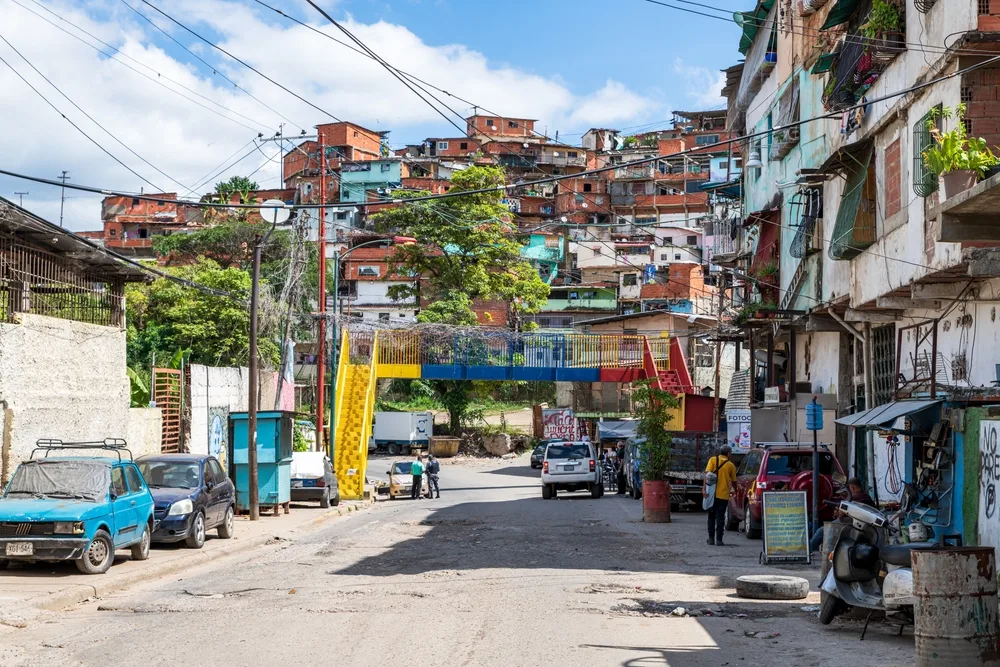
Caracas, Venezuela, 11.27.2021: view of the main street of the suburb of “Cota 905” located on a hill./Giongi63/Shutterstock
Unfortunately, violent crime is prevalent throughout Venezuela. There are certain areas where the crime rate is even higher, so even if you decide to risk going to the country, you should avoid those areas or exercise additional caution.
Transiting through Maiquetía Simón Bolívar International Airport is inevitable if you decide to go to Venezuela. However, the airport is a hotspot for crime.
Many criminals pose as taxi drivers or officials there to rob tourists, so only use reputable transport when going there. Only fly in and out during the day because the road to the airport attracts criminal groups.
Avoid all of Venezuela’s borders, including the land borders with Colombia, Guyana, and Brazil, and the maritime borders with Aruba, Bonaire, and Curaçao. They are a hotspot for organized crime, including some terrorist activity.
Within Caracas, there are certain neighborhoods that have higher crime rates.
The barrios, or informal slums, on the outskirts of the city have high crime rates. Central Caracas and the Sabana Grande district also have high crime rates according to the Australian government.
Frequently Asked Questions
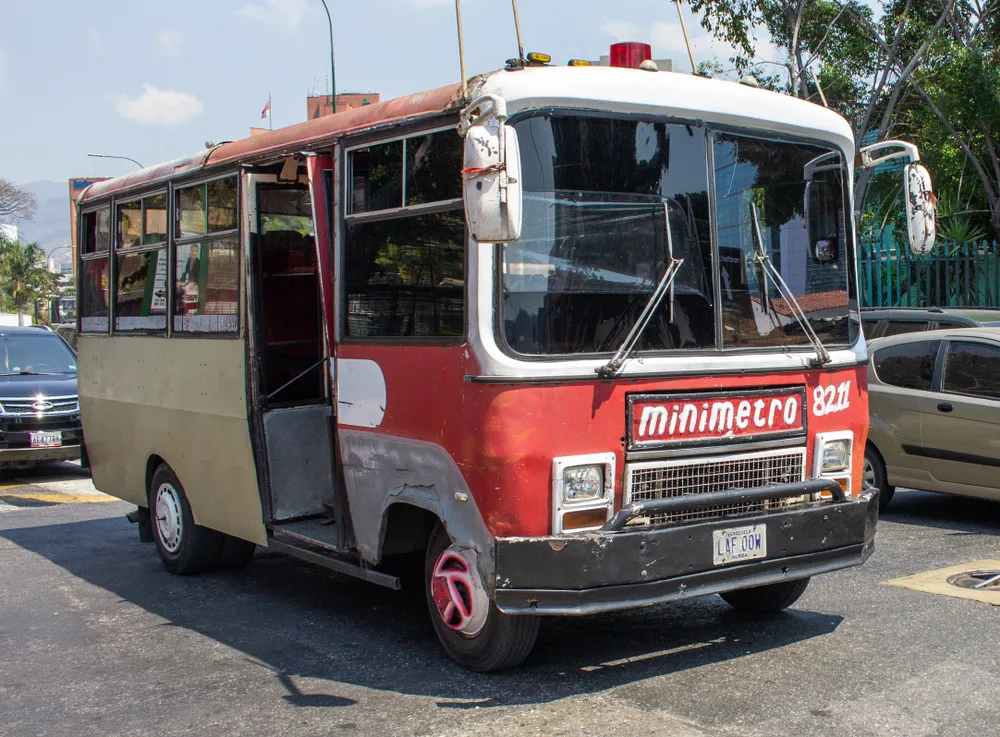
Caracas, Venezuela. 03.07.2019. A old bus working in Caracas/Rommel Gorosabel/Shutterstock
Here are some more questions you might have about Venezuela:
Is Venezuela good for tourists?
Venezuela is not good for tourists due to the high rates of crime, many of which target foreigners. Tourists have been the victims of armed robbery, kidnapping, sexual assault, and even murder in Venezuela.
Will Venezuela ever be a safe place to visit?
Hopefully, Venezuela will be a safe place to visit as there are many beautiful attractions in the country. However, for that to happen, the economy and political situation will have to stabilize, and it’s hard to know when that will occur.
Can US citizens go to Venezuela?
US citizens can go to Venezuela with a valid tourist visa. However, keep in mind that relations between the two countries are tense, and authorities are quick to interpret law-breaking by US citizens, such as attempting to enter without a visa, in the worst possible light.
Is Venezuela cheap to visit?
Venezuela is absolutely cheap — for foreigners. The high inflation and low purchasing power of the local currency mean that the exchange rate works in your favor. However, keep in mind that shortages often mean you won’t have anything to buy with your newfound riches.
What is the safest city in Venezuela?
The safest city in Venezuela is Merida because it has the lowest crime rate. However, safe is a relative term in Venezuela — its crime index is still very high by global standards.
So, Is Venezuela Safe to Visit in 2025?
Venezuela is not safe to visit right now. The high rate of violent crime affects locals and foreigners alike. You could be the victim of an armed robbery or kidnapping attempt at any time.
Until the political and economic situation calms down, lowering the incentives for crime, stick to dreaming about Venezuela, not actually visiting. Fortunately for you, however, there are many other places in South America to visit that are just as beautiful. Happy travels!



